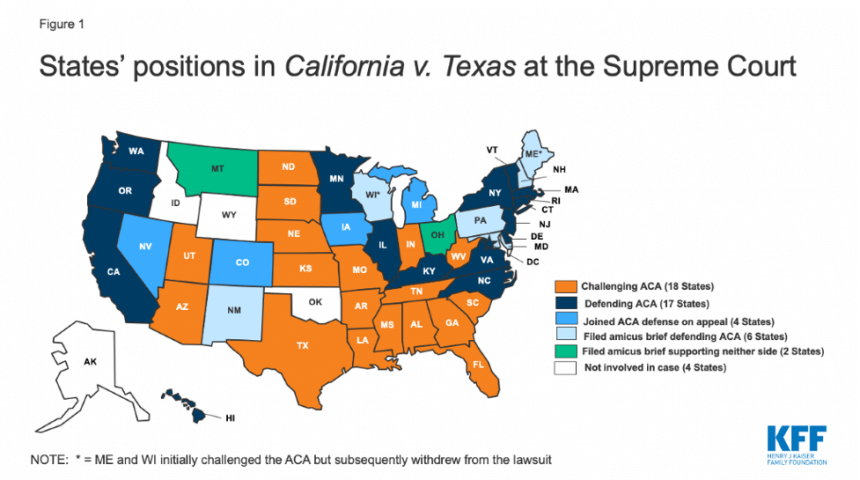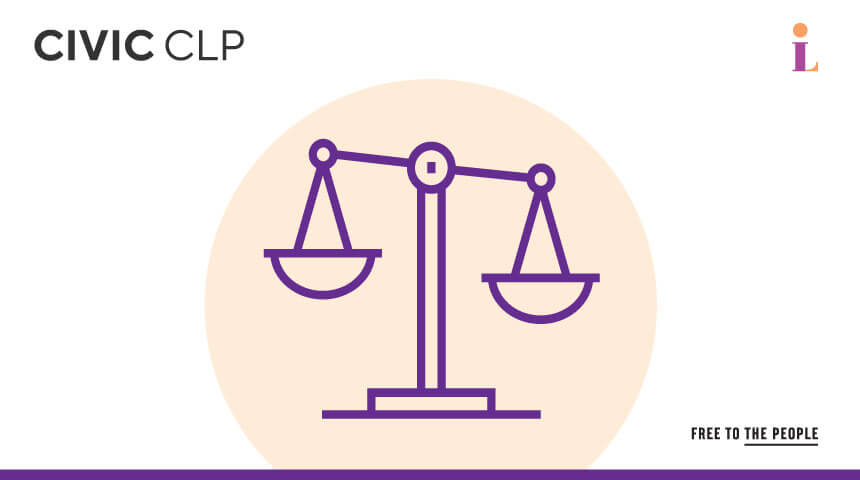On November 10, 2020, the Supreme Court heard oral arguments against the Affordable Care Act, which was passed 10 years ago under the Obama administration. A recording of the oral argument is available on C-SPAN’s website. These arguments are a continuation of the Texas v. California case, which began in February 2018, when 2 individuals and 20 Republican-led states, led by Texas, sued the federal government in an attempt to overturn the ACA. The Trump administration joined the states in opposition, while House Democrats and 21 state attorney generals, led by California, intervened to defend the law. (Source: Women’s Law Project)
In December 2019, a federal appeals court ruled that part of the law was unconstitutional, namely a mandate which stated that “Americans shall buy qualifying policies.” This ruling led to the case being taken up by the Supreme Court. In the oral arguments on November 10th, the Trump administration and 18 Republican-led states (Wisconsin and Maine withdrew from the case in early 2019) referred to this unconstitutional ruling to request that the Supreme Court overturn the entire law.
An official decision is expected in Spring 2021, but the Supreme Court justices made several statements after the hearing. Justice Brett Kavanaugh’s statement suggested that rather than invalidating the entire law, there are precedents that could allow them to sever the mandate from the law and leave the rest of the law intact. (Source: CNN)

Overview of the Affordable Care Act
The Affordable Care Act (often referred to as ACA, PPACA, or “Obamacare”) was enacted in March 2010 with the intention of making affordable health insurance available to more people. As stated on HealthCare.gov, “the law provides consumers with subsidies (“premium tax credits”) that lower costs for households with incomes between 100% and 400% of the federal poverty level.” (Source: HealthCare.gov) The law also expands the Medicaid program, though this expansion varies from state to state (Pennsylvania expanded Medicaid in 2015).
The ACA was notably the first federal law to broadly prohibit sex discrimination in health care. (Source: Women’s Law Project) Finally, the Affordable Care Act supports innovative medical care delivery methods, which are designed to lower the costs of health care in general. You can read the full Affordable Care Act law on HealthCare.gov.
Affordable Care Act Timeline
This is not the first time the Affordable Care Act has been brought before the Supreme Court. Below is a summarized timeline of how the ACA came to be, and where it stands today as we wait for a ruling from the Supreme Court on whether they will sever the unconstitutional mandate from the law or disband the entire law altogether. More detailed timelines are available at AffordableHealthCa.com and EHealthInsurance.com.
- November 7, 2009: The House of Representatives votes on the Affordable Health Care for America Act (HR 3962). The bill is approved 220-215. Only one Republican voted for the bill, while 39 Democrats voted against it.
- December 24, 2009: Senate approves similar legislation for health care reform in a 60-30 vote, with all Democrats voting for the bill and all Republicans voting against it. Passage of this bill means there is majority agreement in both the House and the Senate.
- March 21, 2010: The Senate’s version of the health care plan is approved by the House in a 219-212 vote. All Republicans and 34 Democrats voted against it.
- March 23, 2010: President Obama signs the Affordable Care Act into law.
- June 2010 – September 2010: Elements of the Affordable Care Act begin to go into effect.
- January 31, 2011: A Florida judge rules that elements of the Affordable Care Act are unconstitutional.
- November 14, 2011: The U.S. Supreme Court agrees to hear arguments against the ACA brought by 26 states and the National Federation of Independent Business.
- June 28, 2012: The U.S. Supreme Court chooses to uphold the major provisions of the ACA.
- November 6, 2012: Obama is re-elected, effectively ensuring the Act will survive another 5 years.
- January 1, 2014: The bulk of ACA changes go into effect.
- March 4, 2015: The U.S. Supreme Court hears oral arguments that the ACA only allows subsidies to be distributed through state-run exchanges, and that regulations implemented by the IRS exceed the authority granted to it by Congress.
- June 25, 2015: The Supreme Court rules 6-3 that subsidies can be distributed through Healthcare.gov if a state does not set up its own exchange.
- November 9, 2016: Donald Trump is elected president. One of his major campaign promises is to “repeal and replace” the ACA.
- March 24, 2017: Republican leaders pull their proposed American Health Care Act after failing to win over Republican conservatives and moderates.
- February 26, 2018: A group of 20 states, led by Texas, sue the federal government seeking to have the entire ACA struck down.
- November 10, 2020: The Supreme Court hears oral arguments in the Texas v. California case.
U.S. Supreme Court Oral Argument: Health Care Law (C-SPAN)
Additional Resources
Texas v. California is a complex case concerning the future of the Affordable Care Act, and has several different outcomes. The Supreme Court could rule to continue the ACA as it is written, to sever the individual mandate from the law, or decide that the individual mandate cannot be severed from the law, which could cause the entire law to be struck down. To learn more about the Affordable Care Act and the details of this case, consider the resources listed below.
- Explaining California v. Texas: A Guide to the Case Challenging the ACA (Source: Kaiser Family Foundation)
- Case Explainer: The Affordable Care Act at the U.S. Supreme Court Nov. 10 (Source: Women’s Law Project)
- Pro and Con on different issues: Is the Patient Protection and Affordable Care Act (Obamacare) Good for America? (Source: ProCon.org)
- Supreme Court of the United States Recent Decisions (Source: Supreme Court)
- Supreme Court of the United States Docket File for California v. Texas (Source: Supreme Court)
- AllSides roundup of Affordable Care Act in the news (Source: AllSides)

